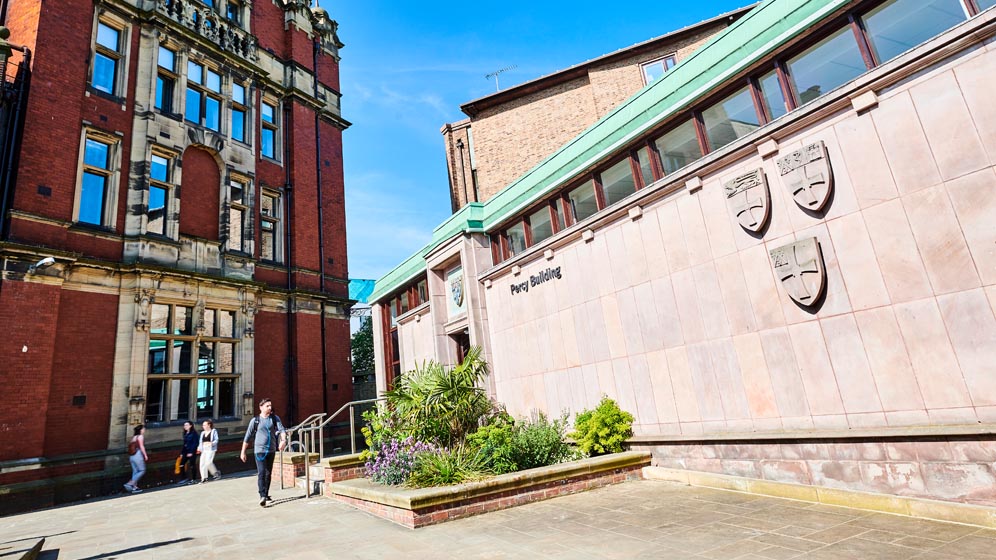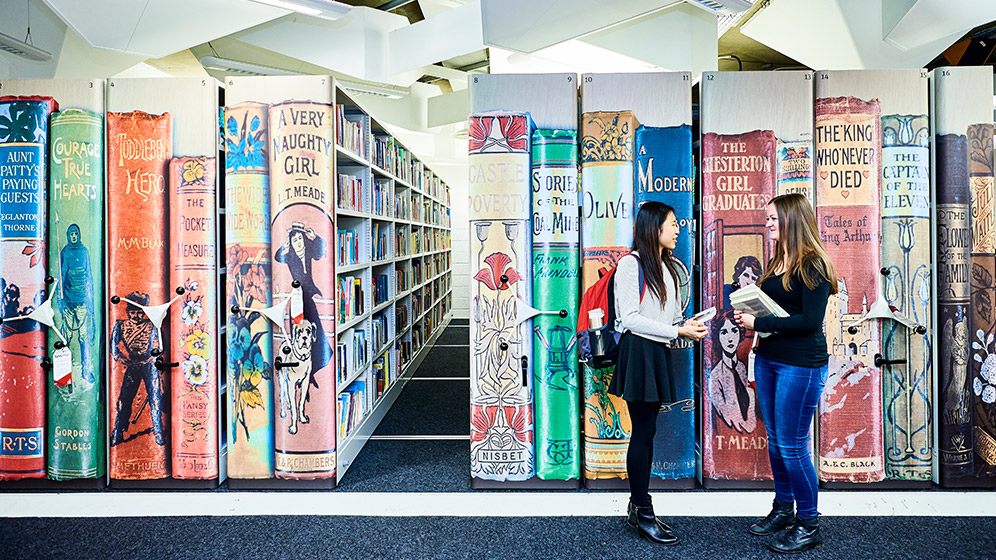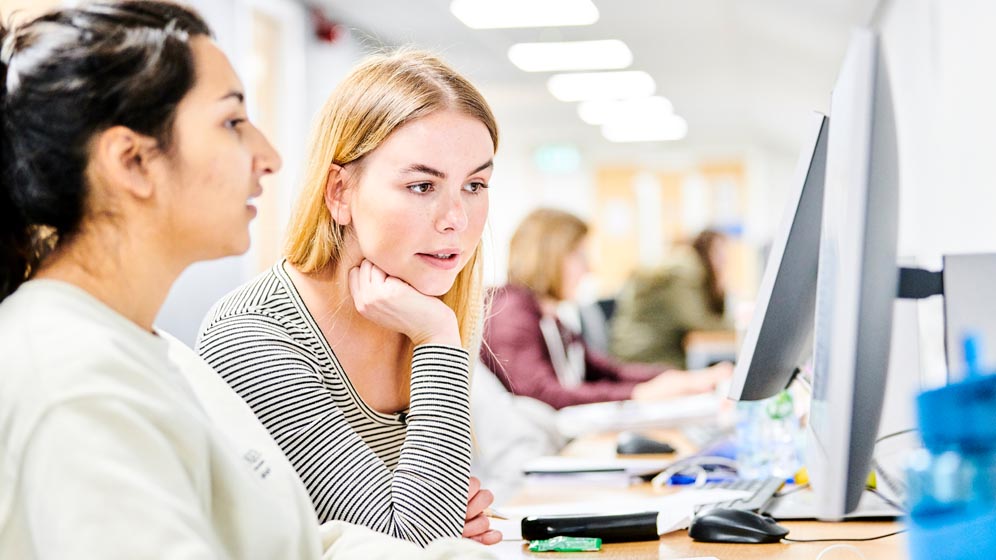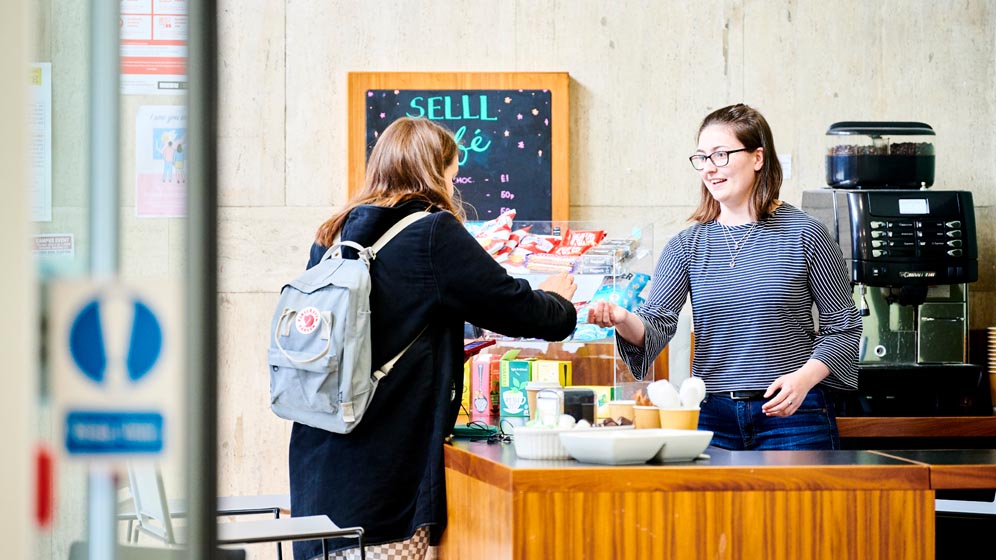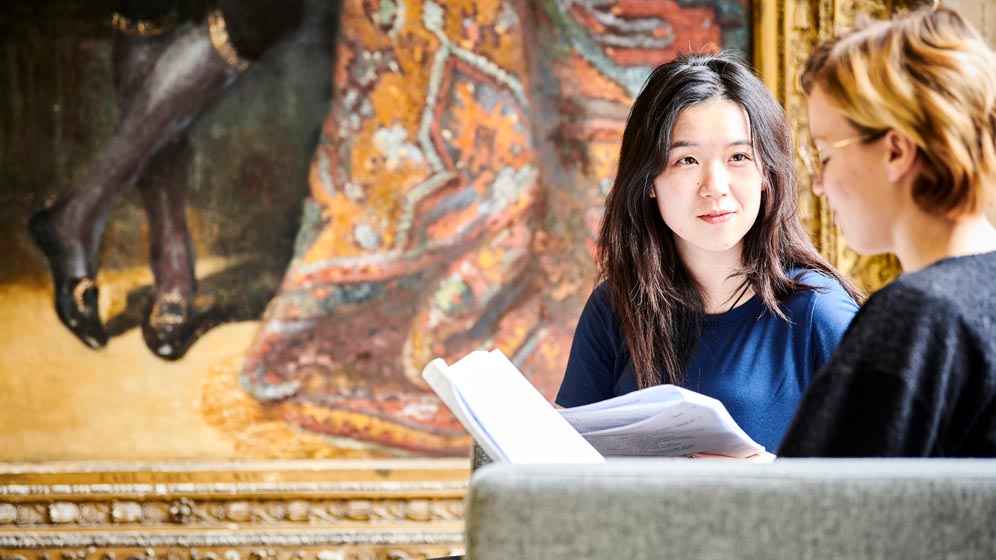English Literature and History BA Honours
- UCAS code: QV31
- Full time
- 3 years
Join our interdisciplinary Literature and History degree to learn how the stories of the past shape our present.
You are currently viewing course information for entry year: 2026
Next start date:
- September 2026
UCAS Institution name and code:
- NEWC / N21
Course overview
Our English Literature and History BA Honours degree brings together cutting-edge research in two disciplines.
Study the latest, most advanced thinking, whether that relates to the early medieval period or the very recent past.
Choose topics that range from postcolonial theory to medieval theology. From Renaissance bodies to climate change protests.
Collaborate with distinguished researchers from History and English Literature, developing your skills in both subjects.
Plan your research around topics that fascinate you. Draw on what you’ve learnt across your degree to create new ideas and insights of your own.
We develop graduates into informed, sophisticated thinkers, comfortable with complexity and nuance. You'll also gain subject-specific research skills and the ability to think between disciplines.
At the end of our degree, you’ll be a confident, knowledgeable, and independent learner.
Your course and study experience - disclaimers and terms and conditions
Please rest assured we make all reasonable efforts to provide you with the programmes, services and facilities described. However, it may be necessary to make changes due to significant disruption, for example in response to Covid-19.
View our Academic experience page, which gives information about your Newcastle University study experience for the academic year 2025-26.
See our terms and conditions and student complaints information, which gives details of circumstances that may lead to changes to programmes, modules or University services.
Quality and ranking
Professional accreditation and recognition
All professional accreditations are reviewed regularly by their professional body.
Modules and learning
Modules
The information below is intended to provide an example of what you will study.
Most degrees are divided into stages. Each stage lasts for one academic year, and you'll complete modules totalling 120 credits by the end of each stage.
Our teaching is informed by research. Course content may change periodically to reflect developments in the discipline, the requirements of external bodies and partners, and student feedback.
Featured module
SEL3444: Envious Show: Wealth, Power and Ambition in Narratives of the Country House, 1550-2000Trace the history and impact of the country house and estate in Britain and Ireland over five hundred years. Consider how the country house forms a crucible in which ideologies of gender, race and class intersect with money, power and ambition.

Optional module availability
Student demand for optional modules may affect availability.
Full details of the modules on offer will be published through the Programme Regulations and Specifications ahead of each academic year. This usually happens in May.
To find out more please see our terms and conditions
This year is all about expanding your skills and knowledge, while supporting you in making the transition to university study. Your two compulsory modules will provide you with the core skills of analysis and interpretation for the study of literature and history.
These skills will underpin your learning and success in your four optional modules in Literature and History which cover a chronological, geographical and cultural range of topics.
You may swap one of these modules for an ‘outside’ module in a third subject of your choice. There are many options available to you such as creative writing, a language, or politics.
Modules
| Compulsory Modules | Credits |
|---|---|
| Evidence and Argument | 20 |
| Doing Criticism | 20 |
| Optional Modules | Credits |
|---|---|
| Global Middle Ages | 20 |
| Stuff: living in a material world | 20 |
| Global Ancient Histories | 20 |
| Historical Sources and Methods | 20 |
| History Lab I | 20 |
| History Lab II | 20 |
| Introduction to Public History | 20 |
| What is History For? | 20 |
| Transformations | 20 |
| Beginnings | 20 |
| Revolutions | 20 |
You will advance your understanding of literature and history by choosing five modules from a generous range of options. You can study courses from the Anglo-Saxon period to the contemporary moment, with rich choice in Renaissance and Romantic Literature, in Global and European Histories, and in Modern and Contemporary Literature.
Your interdisciplinary Independent Research Project provides you with the exciting opportunity to bring together history and literature in a single project. Supported by scholars in each discipline, you will plan and write an essay on a topic you have studied together.
Modules
| Compulsory Modules | Credits |
|---|---|
| Research Project in English Literature and History | 20 |
You only take one of the following modules if you undertake the Study Abroad exchange programme:
This year builds in further opportunities to pursue the topics that interest you.
You will conduct a major piece of original, independent research, through a jointly-supervised interdisciplinary dissertation, on a topic chosen by you.
Your dissertation could be inspired, for example, by an archive in the University’s broad and impressive range of holdings, such as the Gertrude Bell archive.
Modules
| Compulsory Modules | Credits |
|---|---|
| Dissertation in English Literature and History | 40 |
We base these figures and graphs on the most up-to-date information available to us. They are based on the modules chosen by our students in 2024-25.
Teaching time is made up of:
- scheduled learning and teaching activities. These are timetabled activities with a member of staff present.
- structured guided learning. These are activities developed by staff to support engagement with module learning. Students or groups of students undertake these activities without direct staff participation or supervision
Teaching and assessment
Teaching methods
You can expect to spend around 10 hours per week attending lectures, seminars and workshops.
You also spend around 25 hours per week on:
- class preparation
- reading
- writing
- other kinds of independent research recommended by your tutor
Assessment methods
You'll be assessed through a combination of:
-
Assessments
-
Assignments – written or fieldwork
-
Coursework
-
Dissertation or research project
-
Essays
-
Examinations – practical or online
-
Group work
-
Portfolio submission
-
Presentations
-
Reflective report/journal
-
Seminar tasks/exercises
Skills and experience
Practical experience
Many of our modules offer practical experience. In history, this might take the form of conducting interviews with people who remember a particular historical event or undertaking archival research. In literary studies, this might include staged readings of plays, editorial work, or masterclasses with outside experts.
You'll also benefit from a range of regular field trips organised by both Schools. Depending on the module, these may include visits to:
- The Wordsworth Trust (Dove Cottage) in the Lake District
- Lindisfarne and Holy Island in Northumberland
- City theatres such as Northern Stage, Live Theatre, and Theatre Royal
- Seven Stories (the National Centre for Children's Books)
- Beamish Living Museum
- The Great North Museum
- Hadrian’s Wall and other Roman sites in Northumberland
- The National Library of Scotland, Edinburgh
- Country houses and estates
Research skills
In Stage 2, you'll undertake an independent research project, and in your final year, you'll write a dissertation. These introduce you to finding, using and understanding original sources for your own research. The capstone of your degree is your own personal research project which you complete at Stage 3.
These projects will allow you to develop your skills across both disciplines and engage in interdisciplinary thinking.
Your Stage 2 and Stage 3 projects require a lot of independent working but you can also apply for a paid vacation scholarship and work alongside researchers on a shared project You'll have first-hand experience working on a project and will enhance your key skills of:
- researching original topics
- gathering, analysing and interpreting literary texts and historical sources
- working on a research project independently or as part of a team
- exploring archival collections
Employability
Employability and the engagement of literature and history with the wider world go hand-in-hand in this degree.
Our module assessments develop a wide range of skills. These can be applied to many different tasks you might be employed to do Your exceptionally strong communication, writing and reasoning skills, coupled with the creativity of your degree, might be used in:
- researching and developing policy for public services and private companies
- journalism and other writing in the public interest
- constructing marketing briefs and drafting website copy
- curating exhibitions and programming events
- teaching and training
Beyond our modules, there are plenty of extracurricular opportunities to gain work experience or develop your portfolio. These range from writing for Newcastle’s student newspaper or volunteering in local primary schools to paid internships in the department.
The Newcastle Centre for Literary Arts, in particular, hires students to work on everything from event management to app design. The centre also runs workshops with professionals in the creative industries.
Opportunities
Study abroad
You can study abroad for one semester in your second year as part of this degree. In Europe we have links with:
- Ghent University, Belgium
- Leipzig University, Germany
- Groningen University, Netherlands
- Radboud University Nijmegen, Netherlands
We also have links with universities in other parts of the world, including Australia, Brazil, Canada, Hong Kong, Singapore, South Korea and the USA, including, but not limited to:
- Monash University, Australia
- University of Sydney, Australia
- McGill University, Canada
- University of Hong Kong
- University of Vermont, USA
Find out more about Study Abroad.
Work placement
During your degree, you’ll have multiple opportunities to undertake a meaningful work placement. In your second and third years, you may choose to take the Career Development Module which offers academic credit for 50 hours of placement. You can choose to carry out your placement via part-time work, volunteering, or in a local school. You will be assessed through a mixture of written work, presentations, and professional skills assessment.
In addition, you'll have the option to spend 9 to 12 months on a work placement. You will receive University support from our dedicated Careers team to help you secure your dream placement in the UK or abroad. Work placements take place between stages 2 and 3.
You'll gain first-hand experience of working in a sector, putting your learning into practice, and developing your professional expertise. Previous placements have been in a range of sectors, including:
- journalism and broadcasting
- sustainable energy
- politics
- digital media and marketing
- education
- finance
- museum and heritage
- travel and tourism
If you choose to take a work placement, it will extend your degree by a year. Placements are subject to availability.
Facilities and environment
Facilities
You'll be based in the School of English Literature, Language and Linguistics. The School is located in the Percy Building, which is at the heart of our city-centre campus. You'll join a lively community of students, academics, writers, and professionals.
You'll have access to:
- a digital media lab – for students with documentary and film-making modules
- a PC cluster
- a student-led café
- plenty of spaces to work and socialise
You will have exceptional library provision from our award-winning Library Service. It houses over one million books and a huge range of electronic resources.
Our literature and creative writing teaching is linked to the Newcastle Centre for the Literary Arts (NCLA) programme. This will give you regular contact with leading creative artists. You'll also have access to a diverse programme of events, including spoken-word events and creative writing courses.
Find out more about the School of English Literature, Language and Linguistics.
Support
You'll have the support of an academic member of staff as a Personal Tutor throughout your degree to help with academic and personal issues affecting your academic progress.
Peer Mentors will help you in your first year. They are fellow students who can help you settle in and answer questions you may have when starting university.
Your future
All students on this degree acquire a range of valuable skills, which they can transfer to many different sectors. These skills include:
- researching and analysing
- reasoning and summarising
- thinking critically and creatively
- writing and speaking persuasively and lucidly
- working independently and collaboratively
- working to tight and multiple deadlines
This is excellent preparation for a wide number of professions and our graduates have gone into a variety of career areas, such as:
- journalism
- media
- publishing
- PR and marketing
- law
- teaching and education
- librarianship
- civil service
Follow in their footsteps
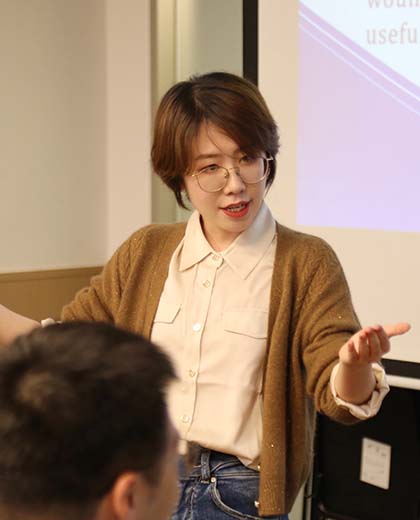
- Name: Penny
- Nationality: Chinese
- Graduated: 2017
- Now working as: English teacher and Head of Research & Development at ReachTop International
"Doing this program has been the most enlightening and enriching experience for me. You also get access to resources and networks in both English and History. This means there are usually more opportunities open to you than to most of your peers."
Find out what Penny liked the most about studying English Literature and History at Newcastle University and how this degree helped her in her career as a teacher.
Careers support
Our Careers Service is one of the largest and best in the country, and we have strong links with employers. We provide an extensive range of opportunities to all students through our ncl+ initiative.
Visit our Careers Service website
Recognition of professional qualifications outside of the UK
If you’re studying an accredited degree and thinking about working in Europe after you graduate, the best place to find current information is the UK Government’s guidance on recognition of UK professional qualifications in EU member states. This official resource explains whether your profession is regulated in another country, what steps you need to take, and which organisation you should contact.
Entry requirements
All candidates are considered on an individual basis and we accept a broad range of qualifications.
The entrance requirements and offers below apply to 2026 entry.
| A-Level | |
|---|---|
| International Baccalaureate | |
|---|---|
Other UK and the Republic of Ireland qualifications
Alternative offers at Newcastle
Through one of our contextual or alternative offer routes, you could receive an offer of up to three grades lower than the typical requirements.
Contextual offers
We use certain contextual data from your UCAS form, alongside your application, to consider challenges that you may have faced in your education and the potential effect this may have had on your qualifications. This means you may be eligible to receive a lower contextual offer.
PARTNERS offers
One of the largest and longest support entry routes to university of its kind for students from underrepresented backgrounds. We support applicants from application through to study.
Realising Opportunities offers
A unique programme delivered in collaboration with 10 leading, research-intensive universities in the UK. The programme is open to students in Year 12/first year of college.
Pathways to Newcastle offers
Pathways to Newcastle, our national skills entry route, is available for specific subject areas.
High Performance Athletes
We support promising athletes at the application stage, who compete in regional, national or international levels in their sport.
Qualifications from outside the UK
English Language requirements
Entrance courses (INTO)
International Pathway courses are specialist programmes designed for international students who want to study in the UK. We provide a range of study options for international students in partnership with INTO.
These courses are specifically designed for international students who want to study in the UK and progress onto one of our undergraduate degrees. Our International Study Centre, has a range of study options including:
- International Foundation
- International Year One
- English Language courses
Find out more about International Pathway courses
Admissions policy
This policy applies to all undergraduate and postgraduate admissions at Newcastle University. It is intended to provide information about our admissions policies and procedures to applicants and potential applicants, to their advisors and family members, and to staff of the University.
University Admissions Policy and related policies and procedures
Credit transfer and Recognition of Prior Learning
Recognition of Prior Learning (RPL) can allow you to convert existing relevant university-level knowledge, skills and experience into credits towards a qualification. Find out more about the RPL policy which may apply to this course.
Tuition fees and scholarships
Tuition fees for academic year 2026-2027
The 2026 entry home fees have not yet been confirmed.
| Qualification: BA Honours | |
|---|---|
|
Home students full time 3 years |
Tuition fees (Year 1)
Not set |
|
International students full time 3 years |
Tuition fees (Year 1)
24,500 |
Year abroad and additional costs
For programmes where you can spend a year on a work placement or studying abroad, you will receive a significant fee reduction for that year.
Some of our degrees involve additional costs which are not covered by your tuition fees.
Scholarships
Find out more about:
Open days and events
You'll have a number of opportunities to meet us throughout the year at our on-campus and virtual open days.
You'll be able to:
- explore our beautiful campus
- find out about our vibrant city
- discover what students think about studying at Newcastle
You'll also have the opportunity to speak to academic staff and find out more about the subjects you're interested in.
Find out about how you can visit Newcastle in person and virtually.
We regularly travel overseas to meet with students interested in studying at Newcastle University. Visit our events calendar to find out when we're visiting your region.
How to apply
Apply through UCAS
To apply for undergraduate study at Newcastle University, you must use the online application system managed by the Universities and Colleges Admissions Service (UCAS). All UK schools and colleges, and a small number of EU and international establishments, are registered with UCAS. You will need:
- the UCAS name and institution codes for Newcastle University (NEWC/N21)
- the UCAS code for the course you want to apply for
- the UCAS 'buzzword' for your school or college
If you are applying independently, or are applying from a school or college which is not registered to manage applications, you will still use the Apply system. You will not need a buzzword.
Apply through UCASApply through an agent
International students often apply to us through an agent. Have a look at our recommended agents and get in touch with them.
Get in touch
By phone
Call us on +44 (0) 191 208 3333 and press option 1. Our opening hours are Monday to Friday 10am until 4pm.
Live chat
Our NCL chatbot might be able to give you an answer straight away. If not, it’ll direct you to someone who can help.
You'll find our NCL chatbot in the bottom right of this page.
Online
Keep updated
We regularly send email updates and extra information about the University.
Receive regular updates by email








